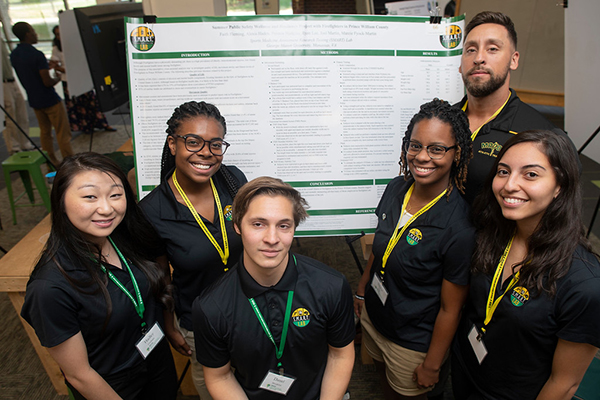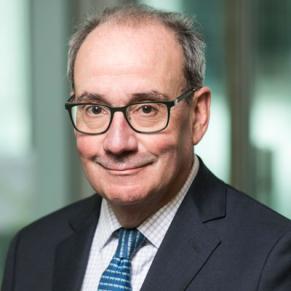Summer 2022
The Center for Biomedical Science & Policy (CBSP)
Schar School of Policy and Government
George Mason University
Location: Virtual and lab research on site with limited 20 seats
Course Dates: July 11th – August 6th (Onsite Study July 25- July 29 )
Class will consist of:
- Three Saturday virtual meetings - July 16th, July 23rd, and August 6th Noon to 2:00pm EST; 9:00am - 11:00am PST;
- Weekly research assignment with TA support;
- One Week of on-site lab research at National Science Foundation (NSF), George Mason University - The Biomedical Research Lab (BRL) - A Biosafety Level 3 (BSL-3) laboratory; Center for Applied Proteomics and Molecular Medicine; Institute for Digital Innovation (IDIA); George Washington Hospital (Ron Paul Kidney Center), etc.
* Commute provided between Fairfax Campus (4400 University Dr. Fairfax, VA 22030) and labs.
Registration Fee:
- Please email execed@gmu.edu for application and program fees.
- Need-based scholarships are available.
Certification: Students who successfully finish the program will receive a Center for Biomedical Science & Policy (CBSP) Young Scholars Research Program Certificate of Completion.

Program Summary
This Young Scholars Research Program is designed for high school and biomed undergrad students, who are interested in doing biology, medicine, biostatistics/informatics, mathematical modeling and big-data analytics research with university faculties. In particular, we aim to work collaboratively on the intersection of biomedicine and artificial intelligence (AI) to generate policy recommendations. We aim that some of these research projects will be supported by extramural research grants from top research funding agencies such as National Institutes of Health (NIH) and National Science Foundation (NSF), as well as other private and public sources including foundations, industry partners and other governmental agencies.
During this program, students will be participating in a research project applying some of the following methods, including but not limited to:
- Biostatistics
- System dynamics modeling
- Network Analysis
- Discrete event simulation
- Markov modeling
Program Goals
- Introduce students to higher education biolab and medical research practice
- Support student career paths by providing hands-on research experience
- Expand student knowledge on a variety of research tools and applications that are used in research in the biomedical context
Program Benefit
- Gain confidence and prepare for transition to college life
- Receive instruction on practical research skills
- Gain valuable teamwork experience and explore possible career paths
- Develop and refine skills for resume
- Network with professionals in the field
Research Projects Highlights and Features
Dr. Olds and Dr. Koizumi will lead students to experience blended research projects and course work from multiple disciplines such as; bioethics and human subject studies, epidemiology and infectious disease by CDC experts, molecular biology case studies by Mason experts, health equity policy by Veterans Health Administration, chronic diseases and the prevention, etc.
Students’ research projects will have the opportunity to be published on The Center for Biomedical Science & Policy website and Multidisciplinary Digital Publishing Institute (MDPI ) Special Issue page -Health and Medical Policy in the Era of Big Data Analytics.
Research Projects include but are not limited to:
National Science Foundation (NSF – ENG: SCH: / 2123683)
2021 - 2025
Title: Collaborative Research: SCH: Optimal Desensitization Protocol in Support of a Kidney Paired Donation (KPD) System – The research team develops a mathematical model to optimize kidney donor swapping among transplant donor-patient pairs.
Bill & Melinda Gates Foundation: Round 12 Grand Challenges Explorations
2014 - 2016
Title: Integrating ICT-based Tuberculosis Treatment Innovations – The research team examined the ICT-based incentive mechanism to promote medication adherence among tuberculosis patients living in slums of India.
National Institutes of Health (NIH-R21 DK088368-01)
2010 - 2013
Title: Using GIS and Simulation for Analyzing Optimal Geographical Boundaries and Organ Allocation Mechanism for Liver Transplantation – The research team looked into redesigning the organ/liver allocation polities for transplants in the United States.
On-site laboratory Research Activities are based on availability from:
- National Science Foundation (NSF) Headquarter
- Meeting with National Institutes of Health (NIH) scientists
- Veterans Health Administration (VHA)
- George Mason University - The Biomedical Research Lab (BRL) - A Biosafety Level 3 (BSL-3) laboratory
- GMU Center for Applied Proteomics and Molecular Medicine
- GMU Institute for Digital Innovation (IDIA)
- George Washington Hospital (Ron Paul Kidney Center)
- Capital Care Inc. (Hospice Organization)
About the Instructors

Dr. Jim Olds is University Professor of Neuroscience and Public Policy at George Mason University. He served from 2014-2018 as head of the Biological Sciences Directorate at the U.S. National Science Foundation (NSF), responsible for an annual budget of $750M. Olds’ former directorate funds the majority of non-biomedical research at America’s research institutions. While there, he was also NSF lead for President Obama’s White House BRAIN project, deputy lead for NSF on Vice President Biden’s Cancer Moonshot and co-chaired the White House Life Sciences Subcommittee of the National Science and Technology Council.
Olds also holds the position of Adjunct Professor in the Department of Anatomy, Physiology and Genetics at the Uniformed Services University of the Health Sciences.
Prior to his time at NSF, Olds was the Director of George Mason University’s Krasnow Institute for Advanced Study, Chair of the Molecular Neuroscience Department and the Shelley Krasnow University Professor of Molecular Neuroscience.
Olds received his Ph.D. in neuroscience from the University of Michigan and his BA in chemistry from Amherst College.

Dr. Naoru Koizumi is Professor of Public Policy and Associate Dean of Research & Grants in the Schar School of Policy and Government at George Mason University. She specializes in medical policies, particularly in the fields of organ transplantation and the end-stage kidney and liver diseases. Her research focuses on the applications of various quantitative methods such as biostatistics, Geographic Information Systems (GIS), simulation and mathematical optimization to analyze various clinical and policy questions related to organ transplantation and other chronic disease treatments. Her projects funded by NIH and NSF include simulations and optimizations of organ allocation (NIH-R21) and bed allocation in a mental health system (NIH-R21 & R01), simulation of slum expansion in India (NSF) and mathematical analysis of illicit kidney trade networks (NSF). Her grant from the Bill & Melinda Gates Foundation investigated effectiveness of ICT-based interventions designed to enhance medication adherence among Tuberculosis patients in India.
Professor Koizumi completed her first doctoral program in Regional Science from the University of Pennsylvania in 2002. The extension of her doctoral research was funded by National Institutes of Health. Her second PhD (2005) is in Environmental and Preventive Medicine from Hyogo College of Medicine, Japan. Before joining the Schar School of Policy and Government, Professor Koizumi was a post-doctoral researcher at the Electrical and Systems Engineering Department of the University of Pennsylvania where she worked on various health sector projects in collaboration with the School of Medicine. Outside academia, Professor Koizumi worked for several international development agencies (IDB and EBRD) and in private consulting, participating primarily in social and environmental sector projects in Latin America and East Europe.
